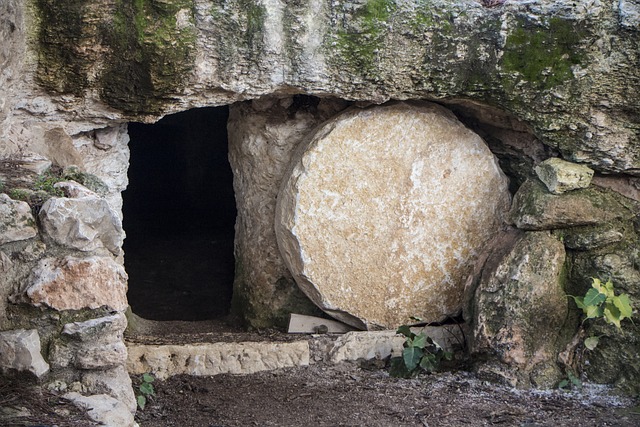“We know that Christ, being raised from the dead, will never die again; death no longer has dominion over him.” (Romans 6:9, ESV) What a strange week this had been in Jerusalem. The Passover celebration. The crucifixion. The pause for the Sabbath. Now, as the first rays of the sun began to pierce the darkness of this first day of the week, Mary Magdalene, Mary the mother of James, and Salome made their way to the tomb. These loyal followers of the Lord carried anointing spices for His body. As the women walked, they discussed a problem. Who could remove…
“That day was the Preparation, and the Sabbath drew near. And the women who had come with Him from Galilee followed after, and they observed the tomb and how His body was laid. Then they returned and prepared spices and fragrant oils. And they rested on the Sabbath according to the commandment.” (Luke 23:54-56, New King James Version) Yesterday in our devotion we visited Calvary and met some of those who stood near the cross. But what about the next day? Let’s walk around Jerusalem and revisit some we met yesterday. On Saturday, the Sabbath, it felt as though someone had muted the sound. Yesterday afternoon, Jesus died on the cross and was hastily placed in a tomb before the Sabbath began. But today . . . the turmoil of yesterday’s events have quietened. Soon life will return to its usual rhythm, and memories of that tragic day will fade. Or will they? Scripture gives us few details about the day between crucifixion Friday and resurrection Sunday. None who were present at Calvary could have walked away unchanged by what they witnessed. What were they thinking and feeling now? Simon, the man who carried Jesus’ cross, had much to ponder.…
“But God demonstrates His own love toward us, in that while we were still sinners, Christ died for us.” (Romans 5:8, NKJV) It was a mixed crowd that gathered that day. In fact, the crowd may have been larger than any previous such event had drawn. This was no family picnic or social gathering. The scene unfolding before them was ugly, gruesome. It was a crucifixion. Simon, a Cyrenian, had been compelled by Roman soldiers to carry the crosspiece of a cross for one of those about to be crucified. Had he heard of this Man now heading to His death at Calvary? Did Simon know this was the Teacher everyone was talking about, perhaps even the long-awaited Messiah? Did he stay to watch what happened to this Man? We do not know. Soldiers stood there. These men may have grown calloused, even cruel, by the life they lived and the orders they were required fulfill. They huddled at one side of the three crosses, casting lots to divide the few garments taken from the prisoners who now hung there. But it was the Man in the middle that they mocked. Some of the religious leaders formed another group of…
“The integrity of the upright guides them, but the crookedness of the treacherous destroys them.” (Proverbs 11:3, ESV) I recently came across a small notebook in a drawer with Bible study and sermon notes from several years ago. Some are dated and include the speaker’s name while others do not show either. Reading through the notebook, I found a statement from the Bible study that caused me to stop and reflect. It said, “Our sermon is not in a [church] building. Our sermon is lived out each day in our lives—without words.” I wish I had written down the speaker’s…
“Therefore, stay awake, for you do not know on what day your Lord is coming.” (Matthew 24:42, ESV) Recently, my sleep was interrupted by a single beep. Then long seconds of silence. Did I really hear something? Beep. More silence. Finally, I forced myself out of bed to find the source of the annoying beep. I suspected a dead battery in either the smoke alarm or the carbon monoxide detector. I knew I was safe, but I needed to take care of the alarm. The next time, it might signal a real emergency. We are surrounded by a variety of warning alerts. One day every month the emergency warning sirens in my area are tested. I know the day and time of the test, so I do not panic when it promptly goes off at 11 A.M. on the set day. But recently that same siren went off in the early evening. This was no test; a severe storm was upon us. I went to my safe place until the storm passed. We pay attention to fire alarms, severe weather warnings, alarms in our home, and alarms on our autos that warn us if we get too close to other…
And calling to him a child, he put him in the midst of them and said, “Truly, I say to you, unless you turn and become like children, you will never enter the kingdom of heaven. Whoever humbles himself like this child is the greatest in the kingdom of heaven.” (Matthew 18:2-4, ESV) Jesus loved children, and children loved Him as well. It was a familiar sight to see them gather as close to Him as possible. This was sometimes to the dismay of the disciples who tried to keep them away. But not the Lord. He told the disciples, “Let the little children come to Me, and do not forbid them; for of such is the kingdom of heaven” (Matthew 19:14, NKJV). Jesus loved having these little ones near Him and even used them to teach the adults some needed lessons. Have you ever wondered what Jesus meant when He told us we must become like little children? First, let’s distinguish between the words childish and childlike. When someone is being childish, they are often acting in a silly, irresponsible, or immature way. If we call someone childish, it usually has a negative undertone. To be childlike, however, implies qualities…


